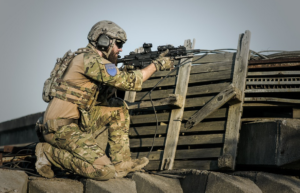In an era where digital landscapes are as contested as physical territories, cybersecurity has become a crucial pillar of national defense. Gone are the days when military might was solely defined by tanks and troops. Today, sophisticated cyber threats loom large, with hackers capable of infiltrating systems to disrupt operations on an unprecedented scale. As nations grapple with these evolving challenges, cutting-edge computer technology emerges as a formidable ally in safeguarding military interests. Understanding this intersection between cybersecurity and national defense is essential for anyone who wants to grasp the dynamics of modern warfare and security strategies. Dive into this exploration of how advanced tech not only defends against attacks but also reshapes the future of our armed forces.
Types of Cybersecurity Threats and Their Impact on Military Operations
Military operations face a variety of cybersecurity threats that can compromise mission success. One major type is malware, which can infiltrate systems and disrupt critical functions. This kind of threat often leads to data breaches, exposing sensitive information. Phishing attacks are another significant concern. These tactics trick personnel into revealing confidential credentials. When military staff falls victim, it could lead to unauthorized access to secure networks. Additionally, nation-state actors pose an advanced threat through sophisticated cyber espionage techniques. They aim to steal intelligence or sabotage operations from afar.
The Role of Cutting-Edge Computer Tech in Protecting Military Operations
Cutting-edge computer technology plays a vital role in safeguarding military operations. Advanced algorithms and artificial intelligence enhance threat detection, allowing forces to respond swiftly to cyber intrusions. Machine learning models analyze vast amounts of data, identifying patterns that human analysts might miss. This proactive approach significantly reduces vulnerabilities. Encryption technologies protect sensitive communications from prying eyes. Quantum encryption is emerging as an unbreakable standard for secure information transfer in the field.
Examples of Innovative Cybersecurity Technologies Used in National Defense

The landscape of national defense is evolving with remarkable technologies. One standout example is artificial intelligence (AI) used in threat detection. AI algorithms analyze vast amounts of data, identifying potential risks faster than human analysts. Next, we have blockchain technology, which enhances data integrity and security. This decentralized approach ensures that military communications remain tamper-proof and authentic. Additionally, quantum cryptography offers a new level of secure communication. By leveraging the principles of quantum mechanics, it promises unbreakable encryption methods for sensitive information.
Challenges and Limitations of Using Cutting-Edge Tech for National Defense
Adopting cutting-edge technology in national defense comes with its own set of challenges. One major issue is the rapid pace of technological advancement. Keeping up can strain budgets and resources, making it difficult for military organizations to stay updated. Cybersecurity threats often evolve faster than defenses can be developed. This creates a constant game of catch-up that can leave systems vulnerable at critical moments. Moreover, integrating new technologies into existing frameworks poses logistical difficulties. Training personnel on advanced systems requires time and investment, which may divert attention from other pressing needs.
Future Implications and Possibilities for Cybersecurity and National Defense

The future of cybersecurity in national defense holds exciting prospects. As technology evolves, so do the strategies against cyber threats. Artificial intelligence will play a pivotal role in detecting anomalies faster than any human could. Quantum computing presents another frontier. Its power may crack encryption methods currently deemed secure. This means developing new algorithms to safeguard sensitive data is crucial. Collaboration between nations can enhance collective security measures. Sharing intelligence and resources might mitigate risks before they escalate into significant incidents.
The landscape of national defense is rapidly changing, driven by the ever-evolving threats in cyberspace. Cybersecurity has become a critical component of military operations. The ramifications of cyberattacks can be devastating, affecting not just data integrity but also mission readiness and overall security. As adversaries enhance their tactics, cutting-edge technology plays an essential role in safeguarding sensitive information and infrastructure. Innovations such as artificial intelligence, machine learning, and blockchain are paving the way for proactive defense mechanisms that can detect vulnerabilities before they are exploited.



 Military hacking is a thing, and it’s super dangerous if confidential state secrets and information fall into the wrong hands because it compromises the nation’s security. What if the enemy launched our nuclear warheads at our own people? What if they could shut down our nuclear base? What if they were able to obtain information about troop movements, secret bases that are still classified, etc.?
Military hacking is a thing, and it’s super dangerous if confidential state secrets and information fall into the wrong hands because it compromises the nation’s security. What if the enemy launched our nuclear warheads at our own people? What if they could shut down our nuclear base? What if they were able to obtain information about troop movements, secret bases that are still classified, etc.?